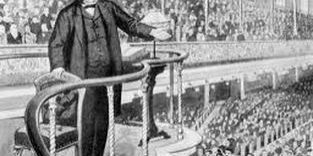
Spurgeon and the Lord’s Use of Means
By Luke Stamps
It is well known that the nineteenth century British Baptist preacher Charles Haddon Spurgeon was a firm believer in both God’s sovereignty in salvation and the free offer of the gospel. So far from setting these things in opposition to one another, Spurgeon believed that God’s sovereignty actually empowers evangelism, because it ensures that the proclamation of gospel will bear fruit by God’s grace. When asked to reconcile divine sovereignty and human responsibility, Spurgeon famously quipped, “I never reconcile two friends.”
Many times, those of us who agree with Spurgeon’s soteriology will cite these kinds of arguments in polemical debates as we seek to answer objections to doctrines like unconditional election and effectual calling. But I wonder if we actually share—in our own personal experience—the perspective of Spurgeon on these matters. In other words, I wonder whether we are saying that God’s sovereignty actually motivates our obedience in evangelism or are merely saying that God’s sovereignty might theoretically motivate someone else’s obedience in evangelism. The latter might ward off the illogical charge that belief in God’s sovereign grace necessarily kills evangelism. But only the former resonates with the point Spurgeon was making. For Spurgeon, the linkage of divine sovereignty and human responsibility wasn’t a matter of theory; it was the actual experience of his ministry.
One of the many places in Spurgeon’s writings where we see this compatibility between God’s effectual work of salvation and the evangelist’s earnest efforts to convince sinners is found in the preface to his book, Around the Wicket Gate. In this book, Spurgeon seeks to convince unbelievers who have approached the precipice of faith to come “around the wicket gate” and enter into salvation:
“Poor fellows! they have come a long way already to get where they are; and the King’s highway, which they seek, is right before them: why do they not take to the Pilgrim Road at once? Alas! they have a great many reasons; and foolish as those reasons are, it needs a very wise man to answer them all. I cannot pretend to do so. Only the Lord himself can remove the folly which is bound up in their hearts, and lead them to take the great, decisive step. Yet the Lord works by means; and I have prepared this little book in the earnest hope that he may work by it to the blessed end of leading seekers to an immediate, simple trust in the Lord Jesus….Therefore am I in terrible earnest to get my hesitating friends over the threshold. Come in! Come in! is my pressing entreaty. ‘Wherefore standest thou without?’ is my solemn inquiry. May the Holy Spirit, render my pleadings effectual with many who shall glance at these pages! May he cause his own Almighty power to create faith in the soul at once!”
Notice the harmony of human and divine efforts in the work of evangelism. Spurgeon acknowledges that he cannot finally persuade anyone to give up the folly of unbelief. Only God himself can effectually bring a sinner to repentance and faith. But this divine work does not inhibit the evangelist’s efforts because “the Lord works by means.” That is, the Lord uses human beings and their proclamation and defense of the gospel as the very means by which he draws his people to himself. This fact makes Spurgeon all the more earnest in pleading with sinners to “come in” to faith in Christ, even as he soaks this evangelistic work in prayer, asking that the Lord would “render [his] pleadings effectual.”
Divine sovereignty and human responsibility fit hand-in-glove in the work of evangelism. For Spurgeon, this wasn’t merely a theoretical argument used to ward off objections to a particular doctrinal position. It was the actual motivation for his gospel ministry. For those of us who share Spurgeon’s commitment to God’s sovereignty in salvation, we would do well to follow his example.
Luke Stamps is a Ph.D. candidate at The Southern Baptist Theological Seminary in systematic theology. Luke is a weekly contributor to the Credo blog and also blogs at Before All Things. Luke is married to Josie, and they have two children, Jack and Claire. Luke is a member of Clifton Baptist Church in Louisville, KY.

